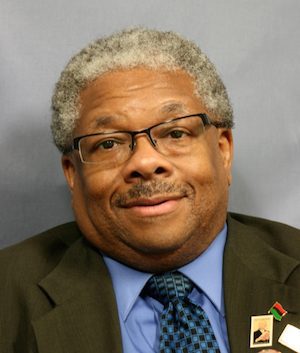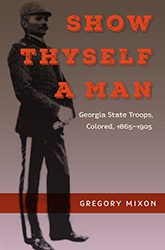Scholar’s Book Analyzes Freedom, Citizenship In Study of Black Militia

History professor Gregory Mixon’s new book analyzes one state’s process of freedom, citizenship and the incorporation of African Americans within the political and economic structure of the United States after the Civil War.
Show Thyself a Man: Georgia State Troops, Colored, 1865-1905 (University Press of Florida) explores the history of Georgia’s black militia and how both independent militias and state-sponsored militias defined freedom and citizenship for African Americans.
“Black people had a vision for freedom after the Civil War,” Mixon says. “They had a vision of what citizenship should be and that vision conflicted with white definitions of post-Civil War freedom and citizenship.” Attempts to fulfill the African American vision of freedom have often met with resistance.
“There were two kinds of militia in Georgia,” he says. “One was an independent militia, which was not associated with state government. Independent militias were used to organize the black community around political and economic issues such as voting and land acquisition. Tunis Campbell was one man who came south to help African Americans organize after the Civil War.”
Tunis Campbell, regarded as an influential African American politician in 19th century Georgia, openly spoke against laws and policies that undercut African American citizenship and economic rights.
State-sponsored militia companies served between 1872 and 1905 as an officially recognized division of state government, and both whites and blacks organized militia units at the county level to use as an instrument to dominate local governance, Mixon says.
“For blacks, independent militias were a means to defend economic rights such as land ownership,” he says. “State militias became more of a ceremonial group in Georgia’s cities.”
State militia companies organized the celebration of Emancipation Day; the anniversary of the 13th, 14th and 15th Amendments; May Day; and Independence Day. If there was an emergency within the state, state militias could be called to restrain any threats to public safety and harmony.
The resistance blacks once faced in their fight for citizenship during the 19th century is still present today, Mixon says. “It’s evident in the threats to the right to vote,” he says. “It’s evident in police-community relations. It’s evident in the disparities of resources and the questions aimed toward the current president of the United States. It is evident in the firestorm b eing dumped on the quarterback for the San Francisco 49ers seeking to define the nation as a nation that sees all as equal.”
eing dumped on the quarterback for the San Francisco 49ers seeking to define the nation as a nation that sees all as equal.”
Mixon’s scholarship offers an in-depth approach to race relations, politics and U.S. urban history. In 2016, he received the Atkins Library Faculty Engagement Award, which honors a UNC Charlotte faculty member who has engaged in innovative or exceptional work with library collections, programs and services. Through the award, presented along with a $2,500 allocation for professional development, Atkins Library recognizes outstanding faculty contributions to its mission, vision and strategic initiatives.
Every semester, Mixon’s students complete an archives assignment in which they visit the Reading Room on the 10th floor of the Library for a “show and tell” of primary sources that relate to the class. The assignment allows each student to explore a manuscript collection and to gain experience with analyzing primary sources, a core research skill in the History curriculum. With Liberal Studies courses, Mixon invites librarians into the lecture hall where students work in small groups to analyze copies of local primary sources from Special Collections.
Mixon has worked with History Librarian Amanda Binder to develop a “Who Am I” project for his 2000 level History courses. In this assignment, students research a profession that interested them, and then identify an African American pioneer in that field. Students use reference sources to gain background information, and then use the library collections to research specific individuals.
Words: Leanna Pough